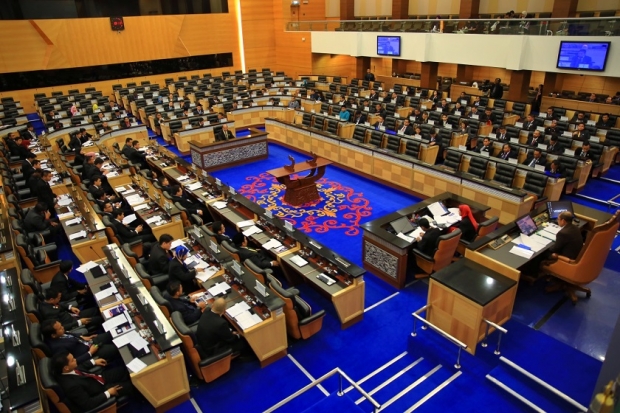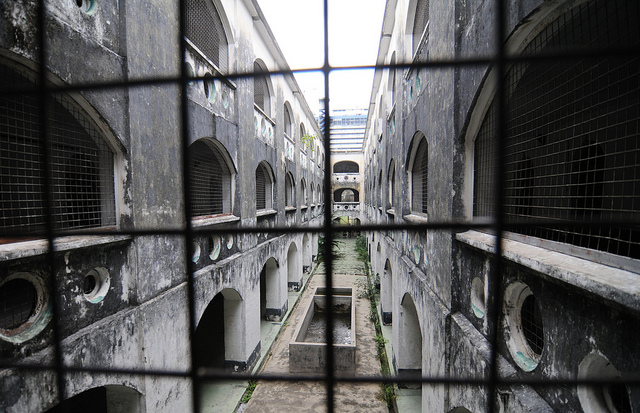14 Things To Know About Changes To The Sedition Act. What's Considered Seditious Now?
On Tuesday, 7 April 2015, the government tabled amendments to the Sedition Act in Parliament.
On Tuesday, 7 April, amendments to the Sedition Act were tabled and on Friday, 10 April, after a 14-hour long debate, the bill has been passed, making the updated Sedition Act an official law now
Parliament today passed a Bill to amend the Sedition Act 1948 after a record debate, effectively granting wider jurisdiction to the authorities to take action on speech or activities that are seen as seditious in nature.
The Bill was passed on a simple majority following a voice vote at 2.30am, after it was debated for over 14 hours and was subjected to one bloc vote at the second reading that ended with 108 MPs for and 79 against.
Putrajaya previously pledged to repeal the Sedition Act that critics say is used to stifle political opposition and dissent, but later announced in November last year that it will be retained and expanded instead.
1. From promising to repeal the Sedition Act to amending it, Najib's reason for doing so was due to concerns over recent acts of excessive provocation
The Minister in the Prime Minister's Department said when there was a proposition to repeal the Act, various parties, including intellectuals and professionals, wanted the legislation to be retained to maintain harmony in the country.
"They are worried that provocations against the royal institution, religion, race, and language will become common especially via social media. So they voiced their concerns because they are extremely worried that provocation will spark tensions when people insult their race or religion," [Nancy Shukri] told reporters at Parliament's lobby.
However, Nancy said she was relieved when Prime Minister Datuk Seri Najib Tun Razak decided to retain it with some amendments.
2. With amendments to the Sedition Act, it is hoped to allow the government to be more transparent
The amendment is in line with the aspiration of the government to be more open and enable the public to give feedback or criticism against the government towards setting up an administration which is transparent and responsible in Malaysia.
3. In one of the changes to the Sedition Act 1948, criticising the government is not considered seditious but criticising Malay rulers is
The act of inciting hatred, contempt or causing dissatisfaction against the government will no longer be offences under the Sedition Act when an amendment to the act is approved.
However, the Malay rulers are still off limits and inciting hatred, contempt or dissatisfaction against that institution will land you in jail for a lengthier time.
malaysiakini.com4. It is also considered not seditious to criticise the judiciary
This bill is also aimed at deleting paragraph 3(1)(c) of the same act to make the act of sowing hatred or contempt or raising dissatisfaction towards the administration of justice in Malaysia no longer regarded as inciting, and as such, would no longer be dealt with as an offence under the act.
5. Insulting religion, however, is a big no-no in order to keep the peace
Nevertheless, to protect the sanctity of religions professed by the multi-religious communities in the country, the government proposed that any individual spreading bad feelings, hostility or hatred between any person or group by using religion, be regarded as having committed an offence under the act.
However, to avoid ambiguity, in relation to Islam, religion refers to the Hukum Syarak as codified under any written law and shall not include any deviant teachings.
6. Punishment under the updated Sedition Act will be compulsory jail time instead of a fine previously
The updated Sedition Act, however, removes a fine as punishment, replacing it with a compulsory jail term.
Furthermore, the old law provided for a maximum jail term of up to three years allowing the courts to maybe let off an offender with only a few months jail. But the latest version of the Sedition Act guarantees a convicted person a minimum of three years behind bars which can go up to seven years.
The new Sedition Act also stipulates a new kind of offence whereby any act of sedition that leads to bodily injury or damage of property will be punishable by at least five years in jail and up to 20 years behind bars.
7. Bail conditions will be less lenient and offenders - including young and first-time offenders - can be denied bail if injuries or damages were caused
For sedition offences resulting in bodily injury or damage to property, an accused can be denied bail if this is backed by a public prosecutor in writing ie. that it would not be in public interest to grant bail.
This particular offence also excludes all forms of leniency meaning a young offender or a first-time offender will not be let off lightly.
8. Offenders charged with sedition will have their passport seized (so they can't pull an Alvin Tan)
In what appeared to be a response to those who fled the country after being charged with sedition, anyone charged with committing sedition (Section 4) must now surrender their passports.
If the accused has yet to have any international travel documents, the courts can order the Immigration director-general not to issue any such documents until the case is resolved.
9. Judicial discretion will be taken away, making sentencing a bit dicey in the Sedition Act
Now, the worrying parts of the amendment bill. First of all, the bill will take away judicial discretion in sentencing. The Court no longer has the option to impose fines upon conviction of a Section 4 sedition offence. Instead, there is now an imprisonment sentence of 3 years. The maximum sentence will also be increased to up to 7 years.
There is absolutely no justification for this. For an Act as wide as the Sedition Act, with no element of intention that must be proven, as well as the disproportionately high conviction rate, judicial discretion in sentencing may at least cushion some of the more draconian aspects of the law. It may be difficult for the Court to acquit a person as the Act casts a wide net on what is deemed to be seditious, but at the very least the Court has options when it comes to sentencing. The bill will take away that option.
10. Changes to the Sedition Act will further be clamping down on electronic media and publication
Even though the old Sedition Act has been used to charged individuals for offences committed online, the updated law makes it clearer by defining publications to include "by electronic means".
It also now allows the courts to issue a prohibition order requiring the person who publishes allegedly seditious material to remove it from the electronic platform and further bar the person from accessing any electronic devices.
Failing to remove the said material is an offence punishable with a fine of up to RM5,000 or a one-year jail term or both. Subsequent failure to comply after conviction will be subjected to a RM3,000 fine and a year's jail in default of payment.
11. A person can be charged under sedition for sharing or re-tweeting content, or simply hosting material deemed as seditious
The government also tabled proposed revisions to the Bill in Parliament today that make it an offence to disseminate seditious speech, with a civil liberties lawyer saying that this means social media users will be held liable for sharing seditious remarks on Facebook or retweeting them, even if they are not the maker of such remarks.
Previously, it was an offence to print, publish, sell, offer for sale, distribute or reproduce any seditious material. However, an additional phrase has been added to the Act namely "cause to be published".
This means someone can be guilty of sedition even if he or she was not directly involved with the material ie. such as hosting the material for an alleged offender. However, protection clauses such as not having knowledge of the seditious material still stand.
12. According to Bar Council President, the updated Sedition Act also has more room for the potential abuse of power
[Bar Council president Steven Thiru] said this aggravated form of sedition which required only a tenuous link between the act of sedition and "bodily harm or property damage "could be easily abused by, for example, agent provocateurs.
"This is unprecedented and unjustified. Bail cannot be used as a form of punishment when there is no conviction. Bail is denied for very serious crimes and sedition, by any stretch, cannot fall under that category," he added.
Moreover, he said the denial of bail depended on a certificate in writing of the public prosecutor.
"The judge has no discretion on whether or not to grant bail once the certificate is issued by the prosecutor. Again, judicial discretion on a critical matter in criminal proceedings is taken out of the hands of the judiciary," he said.
13. The amendments on the Sedition Act received criticisms from lawmakers of both sides, Pakatan Rakyat and Barisan Nasional
Lawmakers from both sides of the divide have criticised the proposed amendments to the Sedition Act 2015, which, they said, are alarming and draconian in nature.
Speaking to the New Straits Times today, lawmakers from Pakatan and Barisan Nasional were critical of the new proposed amendments, which seek to allow the prosecution to deny anyone charged with Sedition from being released on bail.
“My view is that power to grant bail should be left to the discretion of the court. If the prosecution has reason to believe bail should not be granted, then they should argue it before a judge who will decide. Bail pertains to freedom of an individual pending trial,” said DAP’s Puchong member of parliament and lawyer Gobind Singh Deo.
14. "The government is declaring war on its people," Datuk Ambiga said of the amendments to the Sedition Act as well as the introduction of POTA
'In fact, if I could quote someone who said this yesterday, by Pota and amendments to the Sedition Act, the government is declaring war on its people and I want to know why they are doing that.
"We are very concerned with the provisions they are proposing and we are very concerned that they have increased the punishment, that they have removed a lot of the discretion of the courts, and we see all that through the Act (Sedition Act)."
[Datuk Ambiga Sreenavasan] also expressed worry over the way amendments to the Sedition Act would be debated, appearing to suggest that the Bill may be bulldozed through, especially when it was only made accessible to lawmakers in the august House yesterday.









